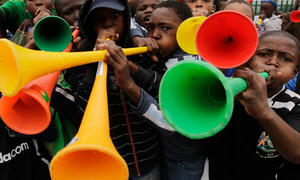World Cup watchTV viewers get relief from the vuvuzela torture
Spectators at the World Cup game cannot escape the unbearable, ear-splitting, keening noise of the vuvuzela, that cheap plastic horn poor South Africans carry with them to soccer games; TV viewers, however, have a relief: Host Broadcast Services, the company that provides the broadcast feed for the World Cup, said it has doubled its audio filters to reduce the constant blaring buzz of vuvuzelas; TV viewers around the globe have complained that the swarm-of-bees sound from the plastic horns is stinging their ears

A bevy of vuvuzuelas // Source: telegraph.co.uk
The World Cup organizers have made two mistakes. First, they appear not to have taken seriously the security concerns soccer fans around the world would have about a trip to crime-ridden South Africa. FIFA hoped that between 1.2 and 1.5 million non-South African would come to the games, but only about 250,000 braved the trip: 223,000 from Europe, Asia, and the Americas, and about 36,000 from other African countries.
To avoid the embarrassment of empty stadiums, FIFA sold hundreds of thousands of tickets at drastically reduced prices to South Africans who were willing to buy them, and also distributed tens of thousands of free tickets in order to fill the stadiums.
There was another miscalculation by FIFA here: many of the poor South Africans who were lucky to get a ticket to one of the games brought with them their vuvuzelas — a cheap plastic horn emitting what can only be described as an unbearable, ear-splitting, keening noise.
Stunned players, coaches, and reporters likened the vuvuzelas’ noise to a deafening swarm of locusts, the unrelenting sound of a giant hive full of very angry bees, or a stampede of noisy elephants.
AHN Sports’ Jojo Doria writes that despite assertions by some of its defenders that the vuvuzela is simply part of the South African experience, an increasing number of soccer fans and players are complaining about the annoying sound of the vuvuzela.
The plastic horn became popular in the 1970s when it was used in Mexican stadiums. It was originally made of tin and became popular in South Africa in the 1990s, commonly blown by fans at local football matches.
The annoying sounds, however, have drowned if not killed the chants and atmosphere usually heard at the World Cup. Fans from the thirty-two countries playing in the World Cup, for example, cannot sing their teams’ songs or in other ways encourage their country’s players.
Many brand the vuvuzela sound as mindless with its unchanging pitch. They complain that this, too, has taken an important element from the experience of watching a soccer game. Soccer spectators would know the ebb and flow of crowd noise — the deathly silence in the second or two before a penalty kick is taken; the quiet desperation that descends on one part of the stadium when the team supported by those sitting there falls behind; the joyous and noisy elation of supporters whose team has just scored.
All these have disappeared in South Africa. In their place all one can hear is the steady, even, unrelenting, unchanging, lamentation of the vuvuzela. There is no connection anymore between what is happening on the pitch and the corresponding noise in the stands. On the pitch one can see the up-and-down rhythm of a soccer match — the game is at times quick, at times slow, at times deliberate, and times explosive, at times boring, at times tense. All these nuances do not find corresponding expression in the stands, as the noise in the stands bears no relationship to the events on the field. Regardless of what is happening on the field, the even, unchanging, steady noise of the vuvuzela is always the same.
Doria writes that the sound is disrupting communication among players on the field during the match, and that it has reportedly disrupted rest of some of the players in their hotel rooms.
The blowing of the instrument have began at other locations, reportedly leading to a ban by some shopping centers.
Relief to television viewers
Unlike spectators in the stands, television viewers have resorted to pressing mute on their remote as the only way to enjoy the World Cup, while others have resorted in combating the constant din with other devices to no avail.
Detroit News wire services report that TV viewers of the World Cup can take out their earplugs because the vuvuzelas are going to have a bit less buzz.
Host Broadcast Services, the company that provides the broadcast feed for the World Cup, said it has doubled its audio filters to reduce the constant blaring buzz of vuvuzelas. TV viewers around the globe have complained that the swarm-of-bees sound from the plastic horns is stinging their ears.
“Despite HBS’ core philosophy, which is to provide ‘realistic’ host broadcast coverage reflecting the ambiance in the stadiums, additional audio filtering has been implemented,” according to the daily newsletter given to rights holders Tuesday.
The filters also will minimize other crowd noise in the stadiums, such as chants and cheers. HBS said it has increased the level in the ball mics to provide some balance.
